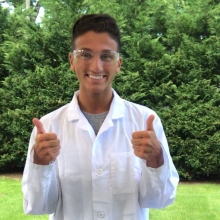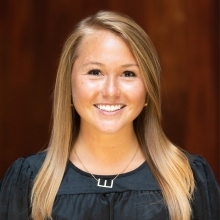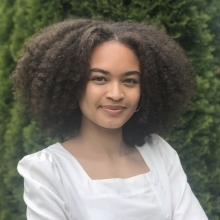
Internships and experiential learning are an integral part of a St. John’s education. However, when the pandemic threw the world into a state of turmoil in early 2020, many planned internships were put on hold or canceled.
Fortunately, through perseverance and creativity—and the help of University Career Services—St. John’s students secured valuable, real-world experience in a wide range of business sectors through remote internships. In this two-part series, students share their experiences of interning from a distance.

David DeLuca
Chemistry
Colgate-Palmolive
Chemistry major David DeLuca planned to spend his summer away from home, living near Colgate–Palmolive’s offices in Piscataway, NJ, where he was scheduled to work as a Research and Development intern.
While the pandemic forced the organization to suspend in-person internships, they ensured all interns that their positions were intact. “I was so blessed that they decided to offer their internships remotely and not cancel them,” he said.
From his home in Lake Grove, NY, David worked on a wide range of projects related to hyaluronic acid (HA) in skin care products. HA is a naturally occurring substance that is often used in these products.
“One project involved doing HA research every day, such as analyzing claims, researching products, looking at different types of HA with different molecular weights,” he said. David also explored the effect of COVID-19 on the field of dermatology from the perspective of a dermatologist and consumer. “We looked at what skin issues people will face now that there is an increased use of PPE and what recommendations we have for them.”
David believes his St. John’s education prepared him well for his role at the global consumer products leader. He explained, “Thanks to my professors, I already had an understanding of how hyaluronic acid works and its different molecular weights,” he said. “It was also very helpful when analyzing data on how much hyaluronic acid penetrates the skin, such as figuring out concentration, molecular weight, and mass.”
Even though he worked from home, David followed a regular schedule every week—working 37.5 hours over the course of five days. Every morning, he had a set meeting from 9 to 9:30 a.m. with his manager, where the pair would discuss his projects and progress. His entire internship experience took place on the Google platform.
David was appreciative of the guidance and mentoring he received at St. John’s from Alison G. Hyslop, Ph.D., Associate Professor and Chair of Chemistry.
“If not for Dr. Hyslop, I would not have even thought to look into Colgate-Palmolive, let alone apply for an internship there,” he said. “I would not have had the experience that I am so grateful for today.”

Erin Kieltyka
Finance
The Estée Lauder Companies
When Erin Kieltyka began to ponder the possibilities for a summer internship, she did not have to look far for inspiration—in fact, she found it in her morning routine.
“I have used Estée Lauder skin care products and make-up for years,” she said. “I have always considered them to be an amazing company, so I knew the opportunities they offer would be ideal to pursue.”
She enlisted the help of University Career Services, which played an instrumental role in connecting Erin to the company. “Jennifer Friary, a Career and Internship Advisor at the Career Center, told me about their internship program and suggested I apply through Handshake,” she said. “She also reached out to an alumna who works there and forwarded my résumé to her. Ms. Friary was a tremendous help.”
Erin added, “When I ultimately received their internship offer, I was beside myself.”
At Estée Lauder, Erin and other interns stayed connected with supervisors and each other using Skype, Zoom, Outlook, and Microsoft Teams. “They mailed every intern a laptop to borrow so that we could have access to all of their software,” she said. “I was in touch with my supervisor multiple times a day via email, and we had scheduled calls twice a week.”
As a member of the intelligence and analytics team, one of Erin’s primary responsibilities was to help analyze marketing dashboards. “I researched the internal use of these marketing dashboards by compiling data on who uses these visualizations, how often, for what reasons, and how they can be improved,” she said. “At the end of the summer, I put together a presentation of my findings and shared it with various teams.”
Erin graduates in May and envisions herself working in finance at a prestige beauty company, such as Estée Lauder. “I had no idea I would love working for a beauty company as much as I did,” she said. “It really felt like home, and I knew almost immediately that it is the industry where I belong.”

Samia Shell
Environmental Science and French
Connecting Food
Little did she know at the time, but Samia Shell became the forerunner to St. John’s virtual Global Internship program last spring, when the pandemic turned an internship in France into a remote internship from her home in the United States.
“It was a perfect opportunity,” she said of her internship with Connecting Food, a French agritech startup. “I was studying abroad at St. John’s Paris location during the spring semester of 2020, when the pandemic became a peak concern in early March. While I was able to briefly attend my internship in person, I was required to return to the US.”
Faced with the potential loss of her dream internship, she reached out to her supervisor and asked about continuing remotely. Fortunately, the company agreed.
As an International Agritech Industry Marketing Intern, Samia’s focus was on enhancing the organization’s visibility internationally, with a focus on the United States, since their company is not well-known in American markets. “Within the company, I was the only American intern,” said the Maryland native. “Because of this, I was prioritized for this role due to my understanding of American agricultural systems and food culture.”
Samia researched potential international partners, assisted in content development for client pilot projects, monitored international dialogue on the agritech industry, and provided options through which the company could market itself as an agent for sustainability.
According to Samia, the biggest challenge of the remote internship was coordinating meetings. “There is a six-hour time difference between the East Coast and Paris,” she noted. “This created some scheduling difficulties during the workday. We found that the most practical time for online video meetings was in the morning for me—which was the afternoon for them.”
Similarly, Samia noted that the internship was “highly flexible” regarding timelines and due dates. “I had the freedom to work on assignments throughout the week, even over the weekend,” she said. “I connected with my supervisor by phone at least once a week, and my progress was tracked via Google Sheets, Google Docs, and emails.”
A double major—Environmental Science and French—Samia found the latter particularly helpful as an intern with a Paris-based organization. “My French major helped me tremendously,” she said. “My grammar courses helped me to comfortably present ideas and debate alternatives with my supervisor and other teammates,” she explained. “Additionally, my course work on French history and culture enabled me to better engage with any cultural discussions that occurred amongst my teammates.”
Samia graduates in May and has plans to matriculate into a J.D. program, where she would like to concentrate on environmental law and human rights. While her time interning abroad was brief, she chooses to focus on all of the good that came from her full internship experience.
“I developed knowledge, skills, and experience in a groundbreaking field and with a company of increasing international influence,” she said. “Above all, I was able to complete this amazing internship despite the pandemic—which is a major silver lining.”
Related News
St. John’s Recognizes Eight for Their Commitment to MLK’s Vision
St. John’s University celebrated the legacy of civil rights icon Dr. Martin Luther King Jr. on January 29 at an evening event sponsored by the Office of Multicultural Affairs (OMA) designed to begin the University’s recognition of Black History Month across the Queens, NY, campus.
St. John’s Online Programs Noted in U.S. News Rankings
U.S. News & World Report, the global authority in education rankings, recently released the 2026 Best Online Programs rankings, the most in-depth evaluation of U.S.-based, degree-granting programs...
Q&A with School of Education Alumna Linda I. Rosa-Lugo, Ed.D. ’77ED, ’79M.S.Ed.
Linda I. Rosa-Lugo, Ed.D. ’77ED, ’79M.S.Ed., recently accepted a new role as President of the American Speech-Language-Hearing Association (ASHA). Prior to this, Dr. Rosa-Lugo has been an active...
